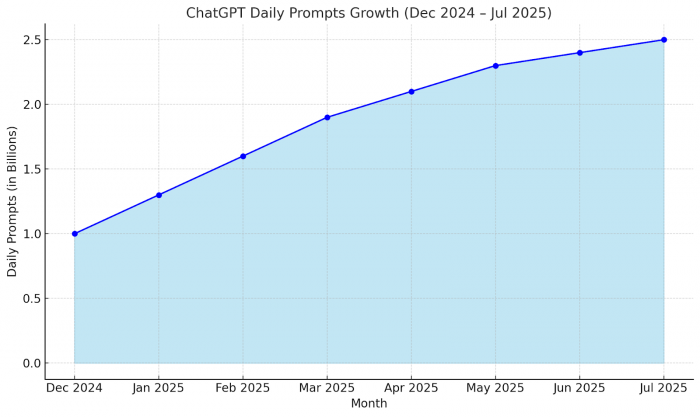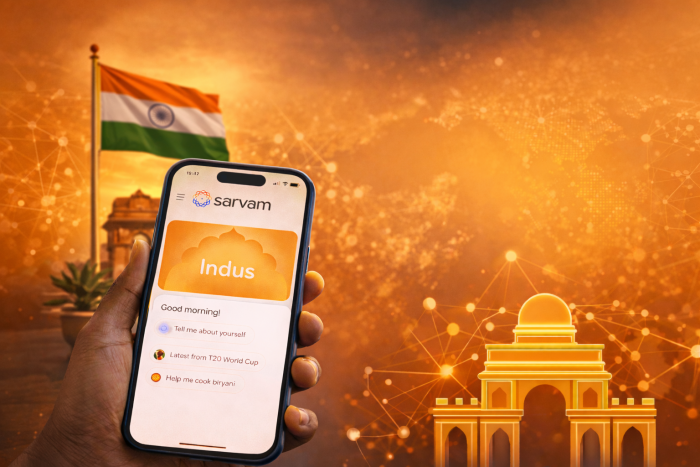On This Page
- From 1B to 2.5B Prompts: The Eight-Month Growth That Changed Everything
- U.S. Leads ChatGPT Engagement: 330 Million Daily Prompts
- Google Search Still Bigger, But the Usage Gap Is Narrowing
- Agents, Not Just Answers: Why Usage Exploded in Q2 2025
- Altman’s Washington Visit: ChatGPT Usage Milestone Fuels AI Access Debate
- OpenAI Prepares Next Layer: AI-Powered Browsers and Persistent Agents
- The Traffic Shift: What ChatGPT Usage Means for the Web
- Final Signal: ChatGPT Is Becoming Infrastructure
OpenAI has confirmed that ChatGPT is now processing over 2.5 billion prompts daily, cementing its role as the most actively used conversational AI platform on the planet. The figure, which includes over 330 million daily prompts from U.S. users alone, represents a sharp uptick in engagement since December 2024—when the platform was serving around 1 billion prompts per day.
This milestone was quietly included in internal updates and publicly referenced by OpenAI in press briefings and AI-focused events this week in Washington, D.C., where CEO Sam Altman has been meeting with policymakers.
From 1B to 2.5B Prompts: The Eight-Month Growth That Changed Everything
What took Google nearly a decade to achieve in query volume, OpenAI has accelerated in less than three years. In December 2024, Altman told reporters that ChatGPT had crossed the 1 billion prompts/day mark. As of July 2025, the number has ballooned by 150%—to 2.5 billion.

That’s over 75 billion prompts per month, or approximately 912 billion annually.
This explosive growth aligns with the launch of GPT-4o, the rollout of agent features that allow users to take actions (like opening apps or browsing), and stronger integrations across platforms. Enterprise adoption has also surged, with companies embedding ChatGPT into internal workflows, CRM tools, customer service, and code review systems.
U.S. Leads ChatGPT Engagement: 330 Million Daily Prompts
The United States remains the single largest contributor to ChatGPT usage, with over 330 million daily prompts originating from U.S. IP addresses, according to internal OpenAI briefings cited by StartupNews.fyi.
While OpenAI did not release full country-by-country breakdowns, analysts believe India, Brazil, Indonesia, and the Philippines are also among the top contributors, based on app store rankings, search trends, and API consumption.
Google Search Still Bigger, But the Usage Gap Is Narrowing
To put the number in context: Google handles about 13 to 16 billion search queries per day, as per third-party estimates from 2024. That puts ChatGPT at roughly 15–20% of Google’s search volume—but the rate of growth is unmatched.
And unlike search queries, which are often one-word or short phrases, ChatGPT prompts are typically long-form, multi-step, and often interactive, making the scale of computation and engagement even more profound.
“This isn’t just query volume. This is cognitive load,” said a senior AI analyst quoted by The Verge. “The model isn’t just finding a link—it’s reasoning, summarizing, coding, even acting.”
Agents, Not Just Answers: Why Usage Exploded in Q2 2025
One reason for the growth? OpenAI’s introduction of “agents”—specialized tools inside ChatGPT that can open files, navigate websites, read documents, and perform real tasks on the user’s behalf. This launched in Q2 2025 and effectively transformed ChatGPT from a smart chatbot into a personal assistant capable of taking actions.
With voice mode, vision tools, and browsing, users aren’t just chatting—they’re completing entire workflows inside the tool:
- Students upload lecture notes and ask for study guides.
- Developers upload codebases and get bug fixes.
- Marketers generate reports, captions, and email drafts in one flow.
These use cases have driven daily session times higher, and moved ChatGPT into app-launcher territory for many users.
Altman’s Washington Visit: ChatGPT Usage Milestone Fuels AI Access Debate
Sam Altman’s appearance in Washington, D.C. this week isn’t coincidental. As Congress weighs proposals around AI regulation, OpenAI is pointing to the 2.5B/day usage number as proof that AI tools are already mainstream—and must remain accessible.
According to Axios, Altman is pushing for a “broad deployment framework” that ensures AI isn’t limited to enterprise paywalls. His message: AI’s economic and educational benefits are maximized when made widely available—a message reinforced by ChatGPT’s usage stats across students, freelancers, and small businesses.
OpenAI Prepares Next Layer: AI-Powered Browsers and Persistent Agents
Behind the scenes, OpenAI is reportedly developing a native browser experience—a potential rival to Chrome or Arc—with ChatGPT built into the navigation layer. Combined with persistent memory and future versions of agents, this could make ChatGPT a true operating layer for daily computing, not just a chatbot.
Internal job listings and leaked demos suggest OpenAI is experimenting with:
- A standalone browser with tab memory, shopping tools, and integrated search.
- Local agent installations that automate recurring desktop tasks.
- API expansions that allow third-party developers to embed agents in their apps.
This infrastructure would dramatically expand how the 2.5 billion daily prompts are routed, stored, and acted upon.
The Traffic Shift: What ChatGPT Usage Means for the Web
There’s a parallel conversation emerging: as ChatGPT absorbs more user intent, web traffic patterns are changing.
Publishers and ecommerce businesses have already reported lower organic traffic following the rise of AI summaries, and ChatGPT’s prompt volume could be a strong leading indicator of further traffic cannibalization. As users ask ChatGPT to summarize articles, recommend products, or answer niche queries, fewer are visiting source sites.
This prompts strategic questions for content creators and SEO specialists:
- How do you optimize content for ChatGPT visibility?
- Will prompt-surfaced summaries replace traditional backlinks?
- Can small businesses rank inside AI agents the same way they fought for Google SERP spots?
Final Signal: ChatGPT Is Becoming Infrastructure
With 2.5 billion daily prompts, ChatGPT is no longer a tool—it’s infrastructure. It’s a new layer of interaction between humans and machines. Whether you're in education, software, marketing, or policymaking, this milestone should prompt not just amazement—but preparation.
The next evolution isn't about asking AI questions. It's about delegating work to it—and billions are already doing just that.
Post Comment
Be the first to post comment!





